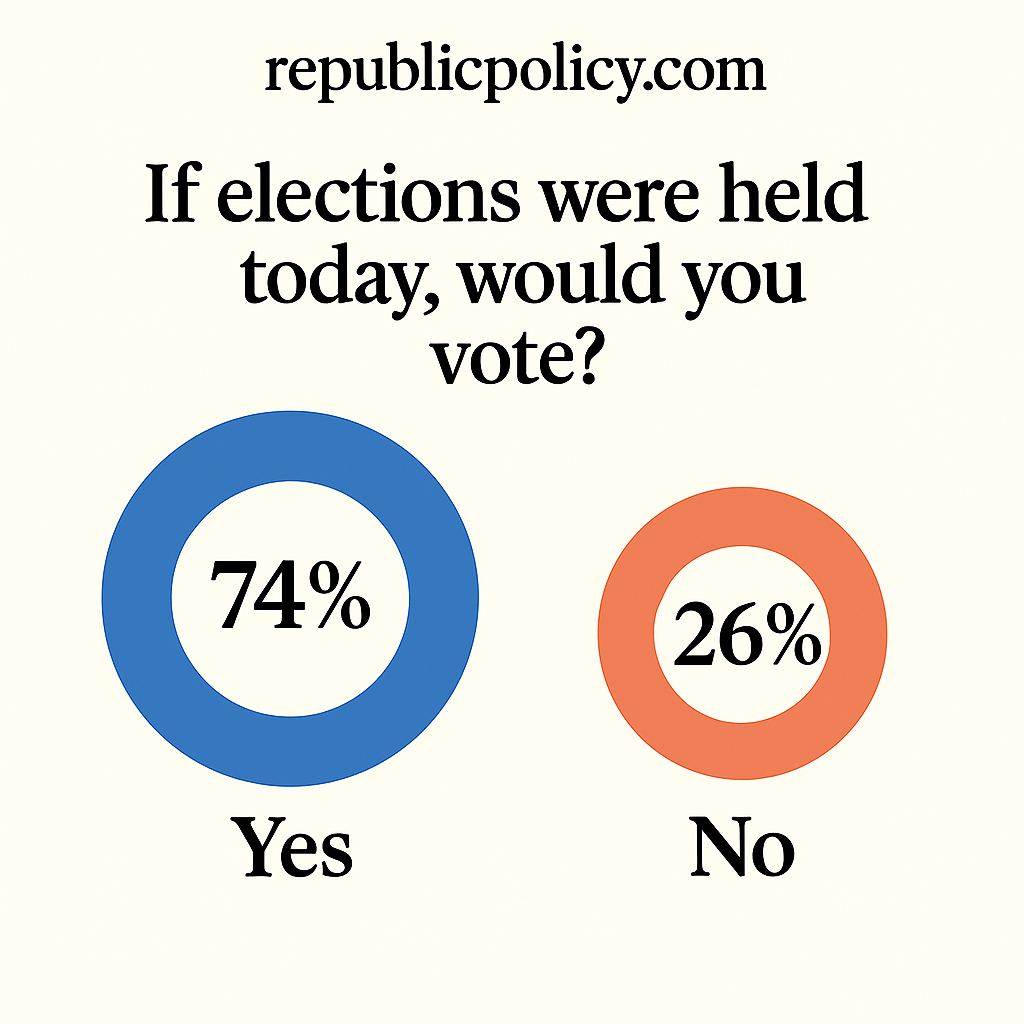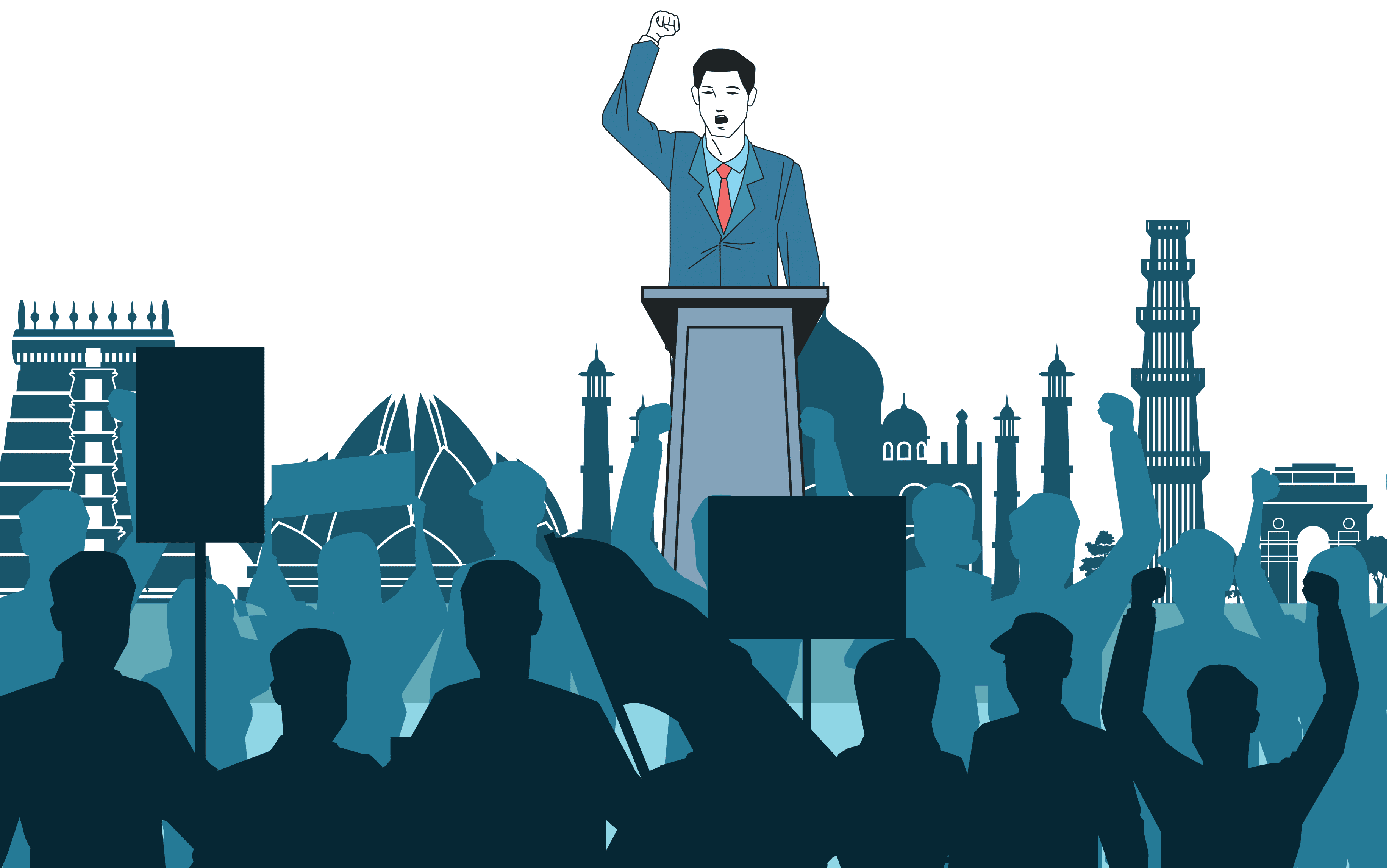Hafeez Ahmed Khan
The Republic Policy July 2025 Survey offers one of the most detailed snapshots of Lahore’s electoral mood in the post-2024 political landscape. According to the findings, 74% of Lahoris express a clear intention to vote if elections were held today. This level of declared engagement is significant, especially in a city that has been at the heart of Pakistan’s political debates, protest movements, and electoral battles for decades. The remaining 26% of respondents stated they would not participate, citing various reasons—ranging from disillusionment with the political process to dissatisfaction with the candidates and parties on offer.
Follow Republic Policy Website
It is important to recognise that the primary survey question—“Which political party would you vote for if elections were held today?”—was posed to the 74% of respondents who expressed a willingness to vote. This means the party preference data, and by extension the political analysis derived from it, does not represent the entirety of Lahore’s eligible electorate, but rather the politically active portion of it. While this is a common methodological approach in electoral research, it also has critical implications for how political parties interpret and respond to the findings.
Follow Republic Policy YouTube
Within this voting-intention group, the survey reveals a striking figure: 23% of the electorate remains undecided about which party to support. This is not a marginal slice of the pie—it is a substantial segment that has the potential to alter the outcome of an election in a city like Lahore, where political competition between major parties is intense and margins of victory can be narrow. The presence of such a high percentage of undecided voters suggests a political marketplace that is both competitive and fluid, offering opportunities for parties that can connect effectively with these hesitant constituents.
Follow Republic Policy Twitter
For political strategists, this 23% undecided block represents both a challenge and an opportunity. On one hand, these voters are not firmly tied to any party’s narrative or ideology, making them open to persuasion. On the other, their hesitation may stem from deeper structural distrust, disappointment with past governance, or a lack of belief in meaningful change. Parties seeking to capture this group must go beyond standard campaign promises and demonstrate tangible commitments to governance, transparency, and public service delivery.
Follow Republic Policy Facebook
The 26% who have opted out of the political process altogether also deserve attention. In a functioning democracy, high voter turnout is a measure of legitimacy. It means, when 26 percent is out of electoral process, and there is only 50 percent actual poll of 74 percent, the total turn out will hover around 35 percent of the total constituency vote, polled. When over a quarter of the electorate abstains, it signals a disconnect between citizens and the political system. The reasons for disengagement—whether rooted in perceptions of electoral fraud, disillusionment with political leadership, or socio-economic barriers to participation—must be addressed if democratic institutions are to retain credibility. Ignoring this segment risks further alienation and may allow anti-democratic narratives to gain strength.
It is also worth noting that Lahore’s political behaviour has historically been shaped by high civic engagement and partisan loyalty. For decades, the city has been a political stronghold for certain parties, particularly the Pakistan Muslim League-Nawaz (PML-N), with rival parties making inroads during periods of national political upheaval. The survey’s findings—especially the size of the undecided vote—indicate that these traditional loyalties are under strain. This could be the result of dissatisfaction with governance performance, perceived failures in upholding electoral integrity, or the broader instability that has characterised Pakistan’s political climate since 2024.
Follow Republic Policy Website
Another key insight from the survey is the interplay between voter intention and actual turnout. While 74% express a willingness to vote, this figure often drops on election day due to logistical challenges, political violence, weather conditions, or personal apathy. Political parties that treat the 74% as a guaranteed voter base risk miscalculating their real electoral strength. Effective mobilisation strategies—ensuring voter registration accuracy, transport to polling stations, and countering misinformation—will be crucial in converting declared intention into actual ballots cast.
Follow Republic Policy YouTube
From a governance perspective, the findings underline the urgency of restoring public trust in the political process. Both the undecided voters and the abstaining 26% are, in different ways, signalling dissatisfaction with the status quo. Electoral reforms, stronger enforcement of campaign finance rules, and transparent vote-counting processes could begin to address these grievances. Without such measures, Pakistan risks perpetuating a cycle where a significant portion of the population either remains disengaged or reluctantly participates without genuine confidence in the outcome.
Follow Republic Policy Twitter
The survey also offers a roadmap for political messaging. For parties leading in the polls, the priority will be to consolidate their base while making selective inroads into the undecided segment. For trailing parties, however, the undecided block offers a potential lifeline—if they can craft a compelling narrative that distinguishes them from both incumbents and other challengers. This may require addressing urban governance issues such as public transport, water supply, housing, and environmental sustainability—areas where voter frustration is often highest and where tangible policy solutions can generate quick credibility gains.
Follow Republic Policy Facebook
In conclusion, the Republic Policy July 2025 Survey paints a complex picture of Lahore’s electoral dynamics. The strong voter intention rate of 74% reflects a city that remains politically engaged despite deep-seated frustrations. The 23% undecided voters represent a critical battleground, while the 26% abstention rate highlights the urgency of rebuilding faith in democratic participation. For Pakistan’s political leadership, the message is clear: winning elections in Lahore will require more than party loyalty or rhetoric. It will demand credibility, reform, and a commitment to addressing the everyday realities of the electorate. Only by bridging the gap between political ambition and public trust can the country hope to strengthen its democratic foundations.
Constituency politics is a science. It all depends upon how a candidate, political party and its workers ensure their potential votes are polled, undecided and refused votes are convinced and most importantly, the opposition votes are demotivated.















